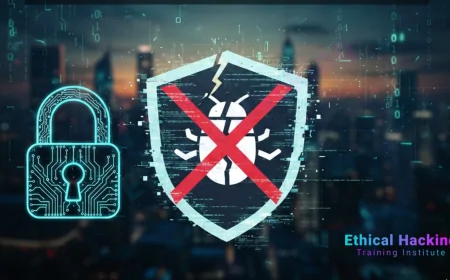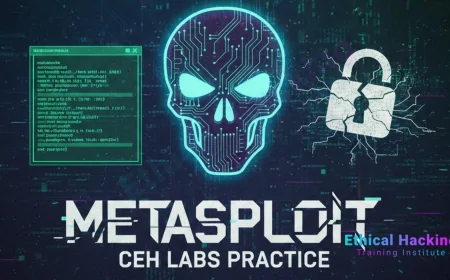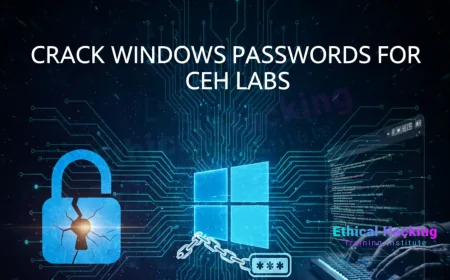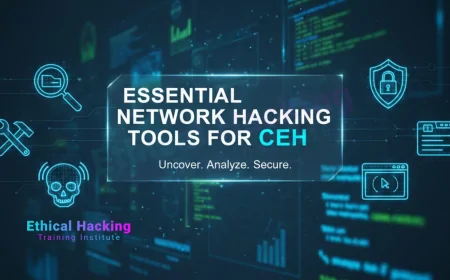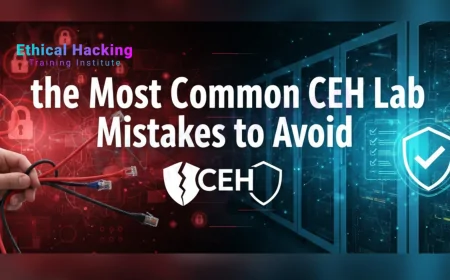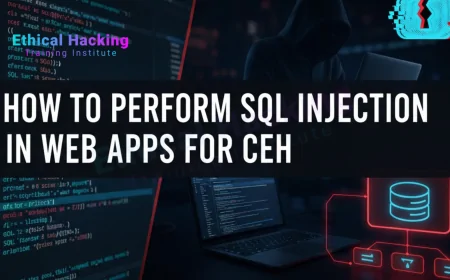Find Ethical Hacker Courses Near You: Best Local Training Programs | Certified Ethical Hacker (CEH) Programs Near You: Best Nearby Classes
Discover the best local ethical hacker courses near you. Learn about top institutes, CEH certification, course fees, hands-on training, placement, and career opportunities in ethical hacking.
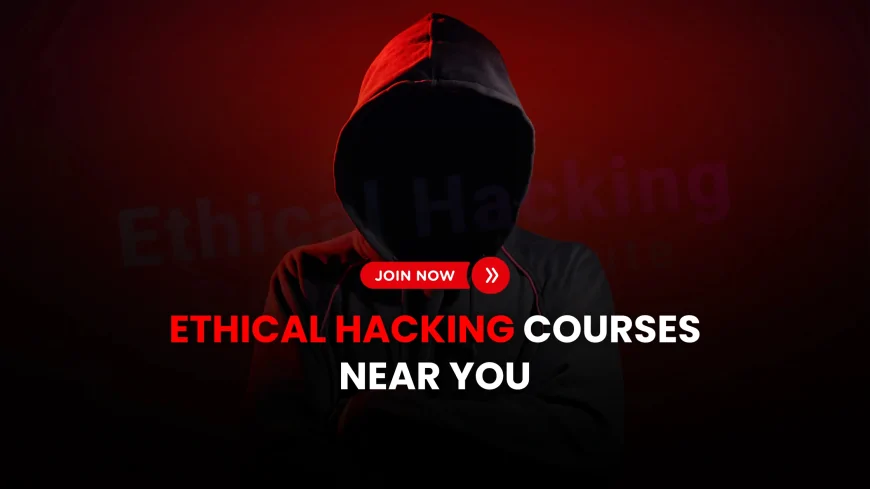
Table of Contents
- Introduction
- Why Learn Ethical Hacking?
- Types of Ethical Hacking Courses Available
- Key Topics Covered in Ethical Hacking Courses
- Popular Ethical Hacker Certifications
- Local Training vs Online Learning
- How to Choose the Right Local Course
- Top Local Training Institutes
- Course Duration and Fees
- Tools and Technologies You’ll Learn
- Hands-On Projects and Labs
- Career Opportunities After Certification
- Freelancing and Bug Bounty Careers
- Real Student Reviews
- Placement Support from Local Institutes
- Government Approved and Accredited Courses
- Suggested Learning Path for Beginners
- FAQs
- Conclusion
Introduction
With cybercrime on the rise, companies, governments, and individuals are investing in cybersecurity like never before. Ethical hacking has emerged as one of the most sought-after skills in the digital economy. Whether you're a beginner or a professional looking to upskill, finding the right ethical hacking course near you can be the gateway to a rewarding career.
Why Learn Ethical Hacking?
Ethical hackers play a critical role in safeguarding organizations by finding and fixing vulnerabilities proactively.It’s a profession where you legally think like a hacker—but for defense, not destruction. As cyberattacks become more frequent, the global job market for ethical hackers continues to expand rapidly.
Types of Ethical Hacking Courses Available
- Beginner Courses: Introduction to cybersecurity, basic networking, Linux fundamentals.
- Advanced Courses: Penetration testing, malware analysis, reverse engineering.
- Certification-Oriented: CEH, CHFI, OSCP, CompTIA Security+.
- Workshops & Bootcamps: Weekend programs with hands-on labs.
Key Topics Covered in Ethical Hacking Courses
- Reconnaissance and Footprinting
- Scanning Networks
- Enumeration Techniques
- System Hacking and Privilege Escalation
- Web Application Attacks (SQLi, XSS, CSRF)
- Wireless Network Exploits
- Sniffing and Session Hijacking
- Cryptography and Steganography
Popular Ethical Hacker Certifications
- Certified Ethical Hacker (CEH) by EC-Council
- Offensive Security Certified Professional (OSCP)
- CompTIA PenTest+
- Certified Penetration Testing Professional (CPENT)
- GIAC Penetration Tester (GPEN)
Local Training vs Online Learning
| Aspect | Local Training | Online Learning |
|---|---|---|
| Interaction | Face-to-face with instructors | Virtual or recorded lectures |
| Practical Labs | Real hardware labs, local networks | Cloud-based virtual labs |
| Flexibility | Fixed schedule | Learn at your own pace |
How to Choose the Right Local Course
- Check institute accreditation (EC-Council, ISO, etc.)
- Read student reviews and ratings
- Compare course content and certification inclusion
- Look for placement or internship opportunities
- Evaluate trainer experience and hands-on labs
Top Local Training Institutes (Examples)
1. WebAsha Technologies – Pune
WebAsha Technologies is a premier cybersecurity and ethical hacking training institute based in Wadgaon Sheri, Pune. It is an EC-Council Accredited Training Center (ATC) that offers hands-on CEH v13 training, practical labs, and real-world attack simulations.
- Key Highlights: CEH certification training, CHFI, ECSA, SOC Analyst, and penetration testing labs
- Location: Office No-10, Laxmi Kunj, Sai Nagari, Wadgaon Sheri, Pune – 411014
- Modes: Online, Classroom (Weekend/Weekday), Fast-track, Corporate batches
- Accreditations: EC-Council, ISO Certified, NSDC Aligned
- Placement Support: Resume help, interview prep, and job referrals
- Website: www.webasha.com
WebAsha stands out for its structured training methodology, experienced trainers, industry-recognized certifications, and strong placement record in Pune’s tech sector.
Course Duration and Fees
Local ethical hacking course durations typically range from 1 week (bootcamps) to 3 months (detailed programs). Fees vary:
- Basic Course: ₹10,000 – ₹25,000
- CEH Certification: ₹30,000 – ₹80,000
- Advanced Pen Testing: ₹50,000+
Tools and Technologies You’ll Learn
- Nmap, Wireshark, Metasploit
- Burp Suite, Aircrack-ng, John the Ripper
- SQLmap, Hydra, Netcat
- OWASP ZAP, Nikto
Hands-On Projects and Labs
The personal attention and community connections of local training make it a popular choice among learners.
- Creating a virtual penetration test lab
- Breaking into vulnerable web apps
- Simulating brute force and phishing attacks
Career Opportunities After Certification
- Ethical Hacker
- Penetration Tester
- Cybersecurity Analyst
- Security Operations Center (SOC) Engineer
- Bug Bounty Hunter
Freelancing and Bug Bounty Careers
With a strong ethical hacking skillset, you can earn money independently by:
- Finding security flaws on platforms like HackerOne, Bugcrowd
- Freelancing for startups and SMEs
- Providing auditing services
Real Student Reviews
Students often choose local courses for direct interaction with instructors and peer collaboration. Look for reviews on Google, LinkedIn, and Reddit before enrolling.
Placement Support from Local Institutes
Many top local training centers offer career services like:
- Resume building & mock interviews
- Job referrals & company tie-ups
- Internships with cybersecurity firms
Government Approved and Accredited Courses
Look for institutes that are certified by EC-Council, NSDC, or ISO for better credibility. Some programs are eligible for Skill India or government funding.
Suggested Learning Path for Beginners
- Start with CompTIA Security+ or a Networking Fundamentals course
- Enroll in an ethical hacking course with hands-on labs
- Get CEH certified
- Move on to OSCP or advanced penetration testing
Frequently Asked Questions (FAQs)
1. What is the best ethical hacker certification?
CEH by EC-Council is the most recognized entry-level certification for ethical hacking worldwide.
2. Can I take ethical hacking courses offline?
Yes, many local institutes offer classroom training with lab support and trainer interaction.
3. How long does it take to become an ethical hacker?
It can take 2–6 months to gain core skills, depending on your learning speed and course format.
4. Is ethical hacking legal?
Yes, as long as it's done with permission and under professional or educational settings.
5. What is the salary of an ethical hacker in India?
Entry-level ethical hackers earn ₹4–8 LPA; experienced professionals can earn ₹15 LPA or more.
6. Are ethical hacker courses available in regional languages?
Some institutes offer bilingual or Hindi-based instruction for better accessibility.
7. What qualifications are needed for ethical hacking?
Basic IT or networking knowledge is helpful. No specific degree is required to start learning.
8. Which cities offer top ethical hacking training?
Top cities include Pune, Bangalore, Delhi, Hyderabad, and Mumbai.
9. Can I work remotely as an ethical hacker?
Yes, many roles including penetration testing and consulting are fully remote or freelance-based.
10. Is ethical hacking a good career?
Yes, it's in high demand globally and offers excellent salary, growth, and job security.
11. Can students join ethical hacker courses?
Yes, even college students can begin learning ethical hacking alongside their studies.
12. What are some free resources to get started?
TryHackMe, Hack The Box, and OWASP are great platforms for beginners to explore for free.
13. What tools are used by ethical hackers?
Nmap, Metasploit, Burp Suite, SQLmap, and Wireshark are common tools used by professionals.
14. Are women encouraged to join ethical hacking?
Yes, the cybersecurity industry actively encourages diversity and inclusion.
15. Do I need to be good at programming?
Basic scripting knowledge (like Python, Bash) is helpful but not mandatory to begin.
16. What is a bug bounty program?
It’s a reward system where companies pay ethical hackers for responsibly disclosing security flaws.
17. Can I take CEH exam without training?
Yes, if you have 2 years of InfoSec experience and apply through EC-Council’s eligibility process.
18. What is the difference between CEH and OSCP?
CEH is beginner-friendly and theory-heavy, while OSCP is advanced and purely hands-on.
19. Are there internships after ethical hacking courses?
Yes, many local institutes help place students in internships post-certification.
20. What’s the future of ethical hacking?
It’s extremely promising due to the increasing rate of cyberattacks and need for skilled defenders.
Conclusion
Choosing the right ethical hacking course near you can be a game-changer in your cybersecurity journey. With hands-on training, expert guidance, and a solid curriculum, local institutes offer a practical and accessible way to build a rewarding career in ethical hacking. Whether you're aiming for CEH, OSCP, or freelancing as a white-hat hacker, the first step starts with choosing the right training partner in your city.
What's Your Reaction?
 Like
0
Like
0
 Dislike
0
Dislike
0
 Love
0
Love
0
 Funny
0
Funny
0
 Angry
0
Angry
0
 Sad
0
Sad
0
 Wow
0
Wow
0
